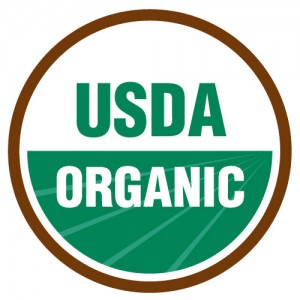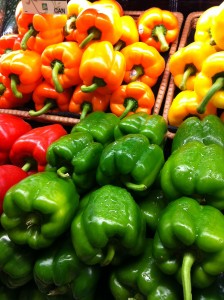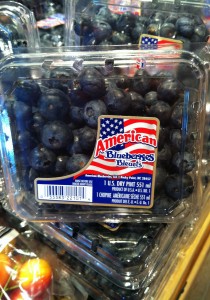There’s a lot of confusion about organic food.

As a mom and consumer, I know organic food garners a premium price. But I like to have choices. My family buys and eats food that looks and tastes good and that we can afford. That includes conventional, organic, biotech, heirloom, domestic, international, and farmer’s market fare.
So how is organic food defined? The USDA sets the standards for foods labeled USDA Organic through the National Organic Program, established by the Organic Foods Production Act of 1990.
Food that meets these standards can display the USDA Organic seal:
Organic crops. The USDA organic seal verifies that irradiation, sewage sludge, synthetic fertilizers, prohibited pesticides, and genetically modified organisms were not used.Organic livestock. The USDA organic seal verifies that producers met animal health and welfare standards, did not use antibiotics or growth hormones, used 100% organic feed, and provided animals with access to the outdoors.Organic multi-ingredient foods. The USDA organic seal verifies that the product has 95% or more certified organic content. If the label claims that it was made with specified organic ingredients, you can be sure that those specific ingredients are certified organic.From the USDA National Organic Program, summary of Organic Standards. The complete text of the legislation regulating the USDA Organic Standards is also available online.
Seems straightforward. Why does confusion about organic food persist?
That brings us to what organic food is not:

Organic food is not more nutritious. This week’s Stanford University study concluded organic food is not healthier than conventional food. This isn’t really new information. Last year Scientific American reported 50 years of research comparisons have shown there are no health differences between organic and conventional food.
Organic food is not pesticide-free. Organic farms may use approved pesticides and fungicides derived from natural sources rather than synthetics to protect crops from insects and disease. Scientific American reported organic pesticides may be worse than those used in conventional farming. Organic food also tends to have more pathogens like E. coli and Salmonella than conventional food. It’s important to note the Stanford researchers found the pesticide levels of all food generally fell within the allowable safety limits.
Organic food is not better for the environment. According to Scientific American, organic farming requires more land to produce the same amount of food as conventional farming. If we were to switch to 100 percent organic farming today, we would have to clear another 20 percent of the ice-free land on earth to make up the difference in production.
Organic food is not necessarily local or fair-trade. Go Green Online reported the average organic food travels 1,200 miles before it reaches the consumer. And organic food may still be produced using illegal migrant workers receiving unfair wages in harsh working conditions.
My family buys and eats many different kinds of food; I’m not advocating one type of food over another. What I’m advocating is education and choice.

We do ourselves a disservice when we pit organic against conventional or biotech, local against domestic or imported. There’s room at the table for all kinds of food to meet many different needs.
There’s freedom for us to learn and decide for ourselves what to eat.
You cause grass to grow for the livestock
and plants for people to use.
You allow them to produce food from the earth. Psalm 104:14 NLT
Blueberry Hill by Fats Domino. Wow.
Do you buy organic, conventional, or both? Why?
Great, great, great post, Aimee! I’m a lot more about buying local than buying organic, especially that very often that “organic” label is just one or two little details away from a lot of local farmers (usually something like resorting to non-organic pesticides to protect the harvest).
I found the best way to get local and great quality fruits and vegetables is farm shares or CSAs. As soon as I can, I will sign back up to one of the local ones called Farmer and the Dale – they even let you pick and choose what 10 units you want in your box, and then deliver to your doorstep. Most of their goodies are organic, but more importantly, all of it is local. And incredibly yummy!
Somewhat of a tangent, but: when I was a kid in Hungary, there were a lot of large, industrial orchards that would let you in for a small fee, let you pick your own apples, peaches, apricots, or whatnot, then on your way out, you would pay for what you take home at a below-market price. Oh, and you get to eat as much as you please. :D I wonder if some farms in the States do this, or would be open to it?
Hi, Nusy! Thanks for weighing in on this one. I remember you mentioned your CSA before and how much you like it. Apart from growing your own food, it sounds like a great way to purchase produce. I believe there are family farms that will allow you to order meats directly, too. They may not be local, but you can choose your ranch.
The idea aobut the orchards is terrific. When we lived in St. Louis, there was a “destination farm” called Eckert’s across the river in Illinois. It was more about the experience of picking your own in the fields than it was about buying below-market price though. I’ll have to see if anyone knows of American orchards that do what you described.
Here’s the link to Eckert’s, not necessarily because I think you will fly across the country to go there, but just because I really like them and have many happy memories of visiting: http://www.eckerts.com
Great topic and love the breakdown. I was sort of an all organic freak …until we added 3 more mouths to feed. I try to buy organic “dirty dozen” items, dairy & meat – but like you mentioned – you still dont know what you are getting & from where ! My favorite is local & in season … Quite the challenge during those Midwest winters ;)
Krisin, thanks for the comment. Food for the masses (okay, for three more children) will put a strain on almost any food budget. That’s why I think this is so important. Feeding our families should not be a competitive sport, especially when there is very little difference between different types of food. I don’t know much about the dirty dozen list, but will check into it.
Aimee,
Thanks for posting this. It’s so simple, but so many people just take what they hear and believe it without researching. I also agree with Ryan’s comment on the labels. Who’s to say that just because a label says “Organic” or “All-Natural” or “Cage-Free” that the animals were cared for and raised better than the ribeye steak harvested from a steer in a Central Kansas feedlot? If ultimate care and welfare standards are followed and all production and processing regulations complied with, there should be no difference between niche marketed and conventional food. I do agree that some of the guidelines for organic labeling are a little loose and this causes people to market questionable “organic” products at a premium while elevating it above conventional. But I also agree with your position that no matter what consumers eat, the important part is their ability to choose and most importantly, be properly educated. Transparency and knowledge is essential to every aspect of the food system!
Austin, thank you for reading and commenting. I love to hear from farmers when I write about food and farm.
The issues surrounding why and how our country got to the point of so much confusion and misinformation about our food supply are overwhelming. This post doesn’t even attempt to address all of it. That’s why I especially appreciate your comment: “It’s so simple.” Because it is if we break the story down into manageable, fact-based pieces.
We raise and do what we do because of food choices. There’s many types of ag – not just organic and GMO but non GMO conventional, what I call ‘common sense’ (basically organic but if something needs sprayed to save the crop do it). Great info in breaking it down – it’s all about choices. Food choices = farm choices
Thank you. I appreciate you mentioning the non-GMO conventional. That category seems to get lost in the mix with organic and biotech taking the headlines so much. And I totally agree with you; it’s all about choices for farmers and consumers.
Very succinct and to the point, Aimee. Very educational. I hope many folks have a chance to view this and can provide comments.
Hugh
Thanks for stopping by, Hugh! It helps me to break down an issue to make sense of it for myself. Hope my readers find it helpful, too.
Aimee,
Interesting to see your perspective. A lot of times people think it has to be one or the other. I know my table includes a wide variety of foods. I have things I buy at supermarkets as well as things from farmers’ markets, friend’s farms, my own backyard, etc. I don’t tend to prioritize the type of production as much as I do other factors like taste and nutrition but know other people who do. It is fine to go whatever way they want.
I think it goes unsaid that having choices is an immense benefit for Americans and in my family, we take full advantage of them. I work with biotechnology on a daily basis, my brother has an organic coop. He loves the connection to the land as do I. We are both filling different roles in producing safe, nutritious food for our communities. That’s pretty great since we both grew up city kids!
Organic food is food. Biotech food is food. Conventional food is food. It has helped me to think well beyond those labels to understanding nutritional needs and exercise, etc. that’s where I have found my greatest impact.
jp
I love the story of you and your brother, JP. It really encompasses how we should be working together, rather than fighting one another and thinking we must make all or nothing choices between types of food. And I’m glad you made the point having choices is a such a benefit to our country. One I hope we preserve. We have to get beyond the labels to the truth that it’s all food. Thanks so much for your comment!
Aimee,
Thanks for sharing these scientific-based FACTS about what is organic and what is not. I would say more often that not, my family enjoys the fruits, vegetables and proteins of conventionally produced food. Why??? Because, I personally am not convinced that organic is nutritionally better. Plus, I can not justify the added cost. Now, that is not to say, I have never bought organic products if it’s something I really want (not need). I absolutely LOVE the FACT that so far we have the freedom and choice to buy whatever types of food we personally deem appropriate for ourselves and family. I just pray that choice and freedom remains!
Me too, Jody. I’m so glad you brought up cost. The cost of organic food is hard to justify for many families. We need to have economical choices. Thank you so much for reading and commenting!
Thanks for sharing insight to the definition of different organic labels and terms Aimee! So many times, we over-look the difference in the terms when making our food choices.
As a college student, my food choices are primarily driven by cost. But I also am very aware of the health value of the foods I’m eating. I don’t buy many organic foods because the ideal of organic farming isn’t worth the added cost, and that’s simply my choice. I do buy some food from farmers markets, and this sometimes includes organics.
The University campus is an environment of food opinions that range from one end of the spectrum to the other. So many times people make their choices based on a label, and that fails to tell so much of the story. The value of production or integrity of the farmer isn’t defined by one label or another, but that’s how people often describe their choice of organic – based on my experience and feedback when asking the question to my peers.
Ryan, you make an excellent point I had not considered: “The value of production or integrity of the farmer isn’t defined by one label or another, but that’s how people often describe their choice of organic.” Bullseye. I’m so glad you came by and commented!
This is at the heart of the contention, I think. Farmers and the businesses that serve them ALL work hard, regardless of whether they are conventional or organic. There are mostly upstanding operators and a few creeps on both sides. A label doesn’t reflect that and we shouldn’t assume it does when making purchasing decisions. Excellent.
Good morning.
Take a look at the definition you posted for USDA approved organic livestock as the easiest example. To me, that definition is useless. So, the label is Also Useless. It is both too explicit and too ambiguous. And at the same time, so take your pick. And the other definitions there, if you poke a little harder, are little better.
Your conclusions, I have NO PROBLEM WITH. But compliance to a standard, when the standard has no value, is a moot point at best and an entire waste of time, and other resources, in general.
You, however, continue to be FULLY APPROVED by the only criteria that counts, otherwise known as my opinion.
(:
Thanks, Roy, I think :)
I used the USDA definition because that’s what’s used to determine what can be certified USDA Organic in this country. The definition is a summary from their website, but I tried to include lots of links back to other pages on their site if you want to read more. It’s a bureaucracy, so there’s more. A lot more if you want to wade through it. I appreciate they took the time to summarize it in a simpler, user-friendly format.
I agree the USDA summary is a bit general and ambiguous. Not sure how to help that other than to go out and walk the field with regulators or farmers to see how the standards apply to real life. That sounds like a good story idea…
Great info.
On a farm tour last year in California, we visited with a strawberry farmer who grows both conventional berries and organic berries. He made a couple of points I thought were interesting:
– organic berries are fertilized with fish meal from nearby canneries.
– organic berries are risky…bugs can easily destroy a field
– many of today’s pesticide formulations are also used in human health, for example, you had a tapeworm, the medication you’re given has a similar formulation to pesticides used in strawberries.
Great post. Very interesting.
Sarah, thank you for your comment and sharing your story from the California strawberry farm. I don’t think most people know or consider what has to be done to grow edible produce, whether its organic or conventional. It’s hard work and there are additives and chemicals (natural or synthetic) that have to be used to protect crops.
The point the farmer made about the pesticide formulations being used in human health is something I’m researching now. I had heard many ingredients in conventional pesticides are derived from natural sources, too. Should be fun to explore and get to the facts.
Super! I’ve meant to dig into that a bit more, but haven’t found the time. He mentioned that formulations today are much, much different than when pesticides first started being used, but I don’t have all of the details. We could probably connect you with him.
That would be terrific! Going to your site now to see if we can connect on FB or Twitter…